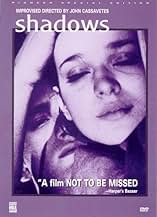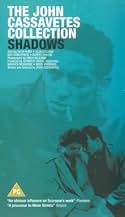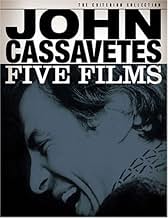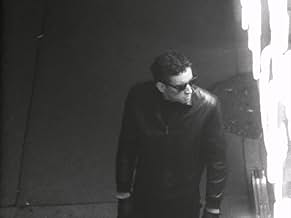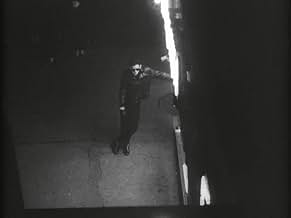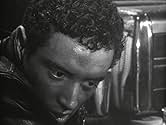AVALIAÇÃO DA IMDb
7,2/10
13 mil
SUA AVALIAÇÃO
O filme improvisado de Cassavetes, com trilha sonora de jazz, explora amizades e relacionamentos inter-raciais na era Beat (1950) na cidade de Nova York.O filme improvisado de Cassavetes, com trilha sonora de jazz, explora amizades e relacionamentos inter-raciais na era Beat (1950) na cidade de Nova York.O filme improvisado de Cassavetes, com trilha sonora de jazz, explora amizades e relacionamentos inter-raciais na era Beat (1950) na cidade de Nova York.
- Direção
- Roteiristas
- Artistas
- Indicado para 4 prêmios BAFTA
- 2 vitórias e 5 indicações no total
David Jones
- Davey
- (as Davey Jones)
- Direção
- Roteiristas
- Elenco e equipe completos
- Produção, bilheteria e muito mais no IMDbPro
Avaliações em destaque
Like all Cassavetes, Shadows makes every movie in recent memory seem irrelevant to your life and how to live it. The theme of 1959's Shadows centers around race and its effects on relations between men and women. As in life, this falls a distant second to the theme of the pervasive and exhausting need for love. Shadows is often billed as the story of a 'black woman who passes as white.' Cassavetes' film illustrates how these stark delineations between races harms those who exist in the shadows in-between. Lelia is a light-skinned part-African woman in New York who falls for an infantile racist white man. When Lelia's boyfriend meets her darker brother Hugh, her lover's true colors are revealed. Hugh is a dignified and caring protector who refuses to let racism erode his positive nature, though he faces blatant economic persecution in his work. Lelia's second brother, a charismatic jazz musician played by the beautiful Benito Carruthers, is also light-skinned. We painfully watch as his displacement in both 'white' and 'black' social groups gives rise to self-loathing and isolation. Ben wandering New York alone, hiding behind a series of dark sunglasses, is an enduring image from the film. One crushing scene shows Ben promising Lelia's lover that he will convey the sickly reasoning behind the rejection to his sister. Ben's palpable pain is relevant to people of every 'shade.' The dismissal of the possibility of love, based solely on race or other peripheral facts, is tragic across the whole spectrum of social relationships.
Shot on a minimal budget of $40,000 with a skeleton six person crew, SHADOWS offers an observation of the tensions and lives of three siblings in an African-American family in which two of the three siblings, Ben (Ben Carruthers) and Lelia (Lelia Goldoni), are light-skinned and able to pass for white. Cassavetes demanded that the actors retain their real names to reflect the actual conflicts within the group but saw the film as being concerned with human problems as opposed imply to racial ones. Cassavetes shot the film in ten minute takes and jagged editing, a reaction against 'seamless' Hollywood production values. Cassavetes main inspiration - at least in the cinematic style the film was shot - were the Italian neo-realists whilst also professing admiration for Welles' pioneering spirit. The use of amateurs and improvisation might resemble some of the Italian neo-realist directors, but with his bebop score by Charles Mingus ans Shafi Hadi, the film feels very different, very American, unlike anything made before really.
The song with the feathered girls, "I feel like a lolly-pop" (or something) feels like light years back to me, ancient history. But no matter how dated it might look, it still makes a delightful time capsule of late Fifties New York today. I think it's this is one of the first films made aspiring filmmakers realize they could shoot an independent film, without Hollywood, improvised and without a real budget. Seymour Cassel, who acted and was involved in SHADOWS, claims it was Jules Dassin's THE NAKED CITY (1948) that was the first and inspired them all, but I think this was the one that really opened the eyes of aspiring independent American filmmakers.
Camera Obscura --- 8/10
The song with the feathered girls, "I feel like a lolly-pop" (or something) feels like light years back to me, ancient history. But no matter how dated it might look, it still makes a delightful time capsule of late Fifties New York today. I think it's this is one of the first films made aspiring filmmakers realize they could shoot an independent film, without Hollywood, improvised and without a real budget. Seymour Cassel, who acted and was involved in SHADOWS, claims it was Jules Dassin's THE NAKED CITY (1948) that was the first and inspired them all, but I think this was the one that really opened the eyes of aspiring independent American filmmakers.
Camera Obscura --- 8/10
1959 was a landmark in the world of film. Several great directors of the classic era were releasing career capping classics that ranked among their best. Just a look at the titles is instructive, Hitchcock's North By Northwest, Billy Wilder's Some Like It Hot, Howard Hawks' Rio Bravo, Douglas Sirk's Imitation of Life. Add a couple from the previous year, Orson Welles' Touch of Evil, Hitch's Vertigo, and Nick Ray's Wind Across the Everglades, and you've got a pretty good summing up of what was possible within the classic Hollywood style.
At the same time, two films appeared that hinted at a whole new way of making films. One was Jean-Luc Godard's Breathless, the other was John Cassavetes Shadows. The two films had certain things in common, largely improvised acting by non stars, handheld cameras, low budgets, and a certain youthful, jazzy swagger. In certain ways, though, they couldn't be farther apart. Godard was still a believer in the director as arbiter of style. He knew more about film than most Hollywood producers, and Breathless was filled with the iconography of the classic crime film. Cassavetes, on the other hand, was an actor, and a refugee from New York's underground theater scene. His first film shows him little impressed with the cinema, and a big believer in actors. Godard's film constantly references it's own artifice, whereas Shadows aims for a certain kind of naturalism.
It doesn't reach it, mainly because naturalism is a myth, particularly in cinema. But it feels powerful, kinetic but lilting like the cool jazz on the score, certainly the main inspiration for the filmmaking style on display here. It ultimately doesn't hold together, mainly because Cassavetes' actors here are amateurish beatniks, where Cassavetes style requires strong, imaginative actors. His later work with Gena Rowlands, Ben Gazarra, and Peter Falk blows this out of the water. Due to the director's technical inexperience, some bits of dialogue had to be redubbed later, which defeats the freshness of the improvisation. Still it's fascinating to watch, both for the great moments (like the scene where Leila Goldoni talks about her dissapointment with losing her virginity) and to watch a groundbreaking artist finding his way.
At the same time, two films appeared that hinted at a whole new way of making films. One was Jean-Luc Godard's Breathless, the other was John Cassavetes Shadows. The two films had certain things in common, largely improvised acting by non stars, handheld cameras, low budgets, and a certain youthful, jazzy swagger. In certain ways, though, they couldn't be farther apart. Godard was still a believer in the director as arbiter of style. He knew more about film than most Hollywood producers, and Breathless was filled with the iconography of the classic crime film. Cassavetes, on the other hand, was an actor, and a refugee from New York's underground theater scene. His first film shows him little impressed with the cinema, and a big believer in actors. Godard's film constantly references it's own artifice, whereas Shadows aims for a certain kind of naturalism.
It doesn't reach it, mainly because naturalism is a myth, particularly in cinema. But it feels powerful, kinetic but lilting like the cool jazz on the score, certainly the main inspiration for the filmmaking style on display here. It ultimately doesn't hold together, mainly because Cassavetes' actors here are amateurish beatniks, where Cassavetes style requires strong, imaginative actors. His later work with Gena Rowlands, Ben Gazarra, and Peter Falk blows this out of the water. Due to the director's technical inexperience, some bits of dialogue had to be redubbed later, which defeats the freshness of the improvisation. Still it's fascinating to watch, both for the great moments (like the scene where Leila Goldoni talks about her dissapointment with losing her virginity) and to watch a groundbreaking artist finding his way.
No need to repeat what little plot there is.
In 1959, movie-making was a closed shop. Between the studios, the craft unions, and the distributors, the only films outside Hollywood were home movies. Add a restrictive Production Code to that shop, and you get a commercial product that's typically slick, entertaining, but all too predictable.
I remember being on a mid-western campus at the time and hearing about Shadows. An independent production gave me ideas that fortunately or unfortunately never materialized. But for many others, the idea took root and, most importantly, helped shake loose the Hollywood monopoly.
No, Shadows is far from a masterpiece by any standard. It is, however, a gutsy, pioneering effort that achieves its own brand of sensibility—it's certainly not slick; then too, it's more interesting than entertaining, and not at all predictable. In short, what's on Cassavetes's screen is largely in contrast to what we expected from feature films of the time.
Instead of conventional story or plot, there are several very loose narrative threads. Instead of prepared script, set, and cast, there are non-professionals and improvisation, though how much, I gather, is debatable. And in place of expected resolutions at movie's end, life simply continues much as it did before.
As a result, there's no expected moral or lesson to events. They simply happen as they happen, but within that framework, new possibilities open up, while the screen comes to look more like everyday experience than an entertainment medium. I gather the aim is to reveal truths at a new level left undisclosed by traditional narrative structure. Something like the 'truth of the moment as it's lived'.
This is certainly no place to attempt a concept like that. However, I can see how movie tradition with its emphasis on structure and artifice would override the momentary and the non-preconceived in favor of the integrity of the whole. So, it looks like Cassavetes not only helped establish the indie, but also aimed at a new way of looking at movies in general.
Anyway, I don't know how well he succeeds with Shadows. However, I do have a lasting image of New York City, that is, of the shabbily gaunt Ben Carruthers hunched down in his leather jacket, perhaps as protection against an uncaring world as he drifts aimlessly down the city street. I'm just sorry that Shadows didn't make it to my long ago campus.
In 1959, movie-making was a closed shop. Between the studios, the craft unions, and the distributors, the only films outside Hollywood were home movies. Add a restrictive Production Code to that shop, and you get a commercial product that's typically slick, entertaining, but all too predictable.
I remember being on a mid-western campus at the time and hearing about Shadows. An independent production gave me ideas that fortunately or unfortunately never materialized. But for many others, the idea took root and, most importantly, helped shake loose the Hollywood monopoly.
No, Shadows is far from a masterpiece by any standard. It is, however, a gutsy, pioneering effort that achieves its own brand of sensibility—it's certainly not slick; then too, it's more interesting than entertaining, and not at all predictable. In short, what's on Cassavetes's screen is largely in contrast to what we expected from feature films of the time.
Instead of conventional story or plot, there are several very loose narrative threads. Instead of prepared script, set, and cast, there are non-professionals and improvisation, though how much, I gather, is debatable. And in place of expected resolutions at movie's end, life simply continues much as it did before.
As a result, there's no expected moral or lesson to events. They simply happen as they happen, but within that framework, new possibilities open up, while the screen comes to look more like everyday experience than an entertainment medium. I gather the aim is to reveal truths at a new level left undisclosed by traditional narrative structure. Something like the 'truth of the moment as it's lived'.
This is certainly no place to attempt a concept like that. However, I can see how movie tradition with its emphasis on structure and artifice would override the momentary and the non-preconceived in favor of the integrity of the whole. So, it looks like Cassavetes not only helped establish the indie, but also aimed at a new way of looking at movies in general.
Anyway, I don't know how well he succeeds with Shadows. However, I do have a lasting image of New York City, that is, of the shabbily gaunt Ben Carruthers hunched down in his leather jacket, perhaps as protection against an uncaring world as he drifts aimlessly down the city street. I'm just sorry that Shadows didn't make it to my long ago campus.
This is the 3rd Cassavetes film I've watched and by far the most riveting -- and I can't tell you why. I realize there's a "debate" about it being improv. or not - but it doesn't matter. There is more honesty in this film (racial and otherwise) than in many others with far higher budgets. I was mesmerized thru the whole thing. New York in the early 60's is a sight to behold, but it's only the perfect backdrop to this film. It's the kind of art that you realize can only be done once. And this was it. The scenes at the MET with the Henry Moore sculptures and others underscored this for me. The movie was made once. The "score" was perfection. There can be no sequel, thank God. This is why film is considered an art form.
Você sabia?
- CuriosidadesThis caused a stir as it fairly explicitly showed an unmarried couple in a post-coital position and its suggestion that a young woman would actively seek out sex.
- Erros de gravaçãoWhen Tony takes Lelia back to her apartment, Ben, Dennis, and Tom are sitting around the table playing poker and trying to arranges some dates. All three bear the marks of a fight that won't take place until near the end of the movie.
- Cenas durante ou pós-créditos"Presented by Jean Shepherd's Night People"
- Versões alternativasCassavetes screened a finished version of Shadows in 1957 and 1958 that ran 78 minutes. Part of the original negative of this version was used for the 1959 version, which was completely re-shot with new actors. In 2002, Prof. Ray Carney of Boston University discovered the only remaining 16mm copy of this earlier version.
- ConexõesFeatured in Cinéastes de notre temps: John Cassavetes (1969)
- Trilhas sonorasBeautiful
Written by Jack Ackerman, Hunt Stevens and Eleanor Winters
Principais escolhas
Faça login para avaliar e ver a lista de recomendações personalizadas
- How long is Shadows?Fornecido pela Alexa
Detalhes
Bilheteria
- Orçamento
- US$ 40.000 (estimativa)
- Faturamento bruto mundial
- US$ 2.729
- Tempo de duração1 hora 21 minutos
- Cor
- Mixagem de som
- Proporção
- 1.37 : 1
Contribua para esta página
Sugerir uma alteração ou adicionar conteúdo ausente





